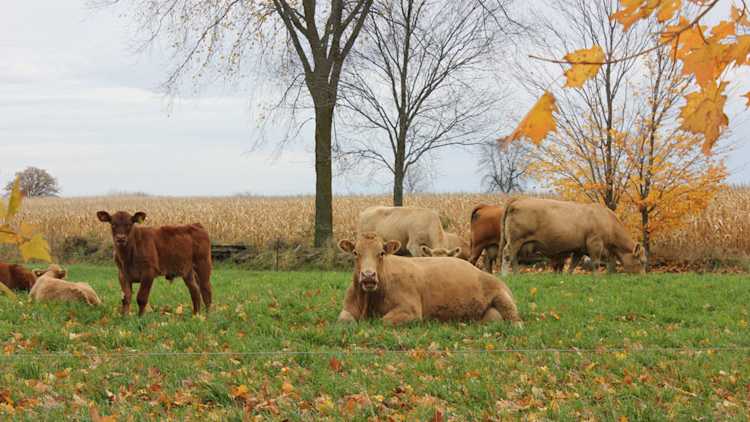FCC customer eager for Sustainability Incentive Program

Cattle producer Julie Dawson has been interested in FCC’s Sustainability Incentive Program since it began last year and was happy to hear she can now apply for the incentive payment.
Eligible customers can apply for FCC incentives as part of the Canadian Roundtable for Sustainable Beef (CRSB) and the McCain Foods partnerships. The Cargill Sustainability Incentive Program is also available this year.
“My husband and I like to stay on top of things and consider our farming operation to be progressive. We are always looking to challenge ourselves and see what we can do to recognize what we feel strongly about,” explained Julie.
“With our herd of beef cattle, we felt the FCC Sustainability Incentive Program was something that would recognize what we were already doing.”
Julie manages a mixed farming operation along with her husband, Andrew, in eastern Ontario.
Julie went through the process to certify their cattle operation as sustainable through the Verified Beef Production Plus program, a partner with the Canadian Roundtable for Sustainable Beef.
She talked to her FCC Relationship Manager about applying for the incentive program.
“Leslie is very aware of the types of things we do, so I don’t think it’s surprising to her that we wanted to apply.”
To apply, cattle producers need to be certified as sustainable through the CRSB. That’s a process Julie completed last summer. It meant updating the Dawson’s record keeping strategies, and having a Verified Beef Production Plus auditor come to their farm to verify how they manage their animals, store pesticides, source feed and use pesticides on forage lands.
The Dawsons wanted to become certified as sustainable because they saw the opportunity to be recognized for the work they were already doing.
“We have been doing conservation tillage for 20 years. We believe in doing as little to disturb the soil and the microbes as possible. Our beef cattle fit into that whole picture. We have been doing rotational grazing for many years. We are trying to use the land in a way that leaves it better than when we found it. It’s who we are and for us it’s a natural fit.”
They also saw the ability to market their beef at local stores and markets as certified, which they believe opens the opportunity to talk about sustainability with their customers.
“Customers want to know that you did your best to raise that animal and that beef, and the stamp is a nice acknowledgment of that,” Julie explained.
“Producers should know they are likely already doing the work, and becoming certified is a natural next step. Chances are they’re already keeping records, looking after their cattle in a way that is seen as positive in the eyes of the national farm animal care council, and they’re already following the code of practice. They just maybe don’t have it all compiled in one area. That’s the next hurdle in the industry and the financial industry is to help producers along to see that part of it.”
Julie is appreciative of FCC’s involvement in sustainability and sees the opportunity to educate more producers on the benefits.